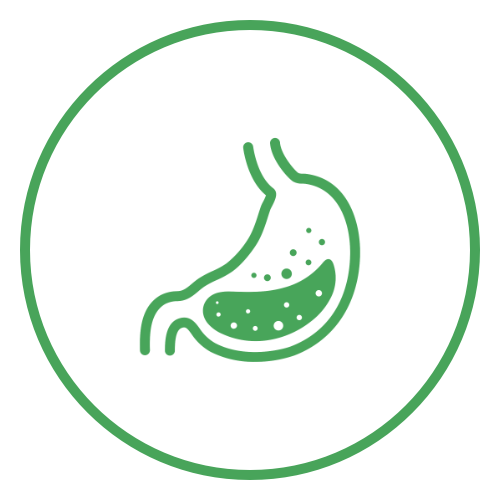Gas and Bloating
Digestive gas, or gas in the digestive tract, is an issue that most people don’t want to talk about but one that we all have and deal with. Digestive gas is typically passed through the rectum or out through the mouth. These are both necessary functions that allow the body to eliminate gas. If we do not pass gas, then it will collect in some part of the digestive tract and cause bloating and discomfort. Gas is typically not a sign of a medical problem, but in some cases it can be. If you are persistently gassy (flatulent) then it is important that you mention this to your doctor during your next checkup.
What Causes Gas?
Upper intestinal digestive gas is caused by swallowed air. Every time you swallow, small amounts of air enter into the stomach. This gas is then passed into the small intestine and out through the rectum.
For some people, they belch out this gas. Repeitve belching also causes stomach material to reflux into the esophagus, creating a gassy or acid-like smell. This can lead to acute or chronic gastritis, which is caused by an infection with a bacterium called Heliocabacter pylori. When this organism gets in the stomach it causes bloating. Doctors can detect this issue with a blood test, biopsy, or by using an endoscope.
People who are under a lot of stress often swallow large amounts of air. Some people swallow air frequently because they have post-nasal drip, smoke, or chew gum. Eating too quickly or wearing poorly fitting dentures can also cause too much air to be swallowed. And most commonly, drinking carbonated beverages increases the chance of gas being created in the digestive tract.
There are also particular foods that tend to cause digestive gas. This includes brussel sprouts, broccoli, cabbage, dried beans, bran, and cauliflower when they are not completely digested by the time that they reach the small intestine. Fiber is also important for promoting health, but for some people it can cause gassiness. This also includes fiber-rich foods such as oatmeal, whole bran, oat bran, fresh fruits, and vegetables. For people that are lactose intolerant, gas and bloating will occur frequently when dairy products are consumed.
How Much Gas Does The Body Produce?
The amount of digestive gas each person produces varies, however most people produce between a pint and a half gallon of gas each day. This gassy mixture consists of oxygen, carbon dioxide, and nitrogen, and is typically odorless. An unpleasant smelling production of gas is caused by trace gases, such as hydrogen sulfide, skittle, and indole which are produced when food decomposes in the colon.
What Causes Abdominal Pain And Bloating?
Eating fatty foods can cause discomfort and bloating because fat keeps the stomach from emptying and allows gas to build up. Eating less fatty meals can help reduce the amount of gas expelled. Researchers have not found a concrete cause for bloating, however it is believed to occur after eating large meals and/or when a large buildup of gas occurs in the stomach. It is important to talk to your doctor about bloating if it is consistent; it could be the sign of another problem.
Is Gassiness Caused By A Disease?
If excess gas is your only symptom, it is probably not caused by a disease. You could have a sluggish bowel, or perhaps your intestines contain a bacteria that produces a lot of digestive gas.
Do Over-The-Counter Drugs Relieve Digestive Gas?
Many people find that over-the-counter drugs can help relieve gassiness. Doctors typically recommend activated charcoal or digestive enzymes (such as lactose supplement lactase) to help relieve gas.
Prevention Of Gas
If it bothers you that you have excessive digestive gas and your doctor has determined that you do not have a disease, then these tips may be helpful.
- Check with a dentist to make sure dentures fit properly.
- Avoid chewing gum or sucking on hard candies (especially sugarless gum or dietetic candies that contain sorbitol).
- Eliminate carbonated beverages from your diet.
- Avoid milk and milk products if you have lactose intolerance.
- Eat fewer gas-producing foods such as cauliflower, brussels sprouts, bran, beans, broccoli, and cabbage.
- Walking, jogging, calisthenics, and other exercise can help to stimulate the passage of gas through the digestive tract.

